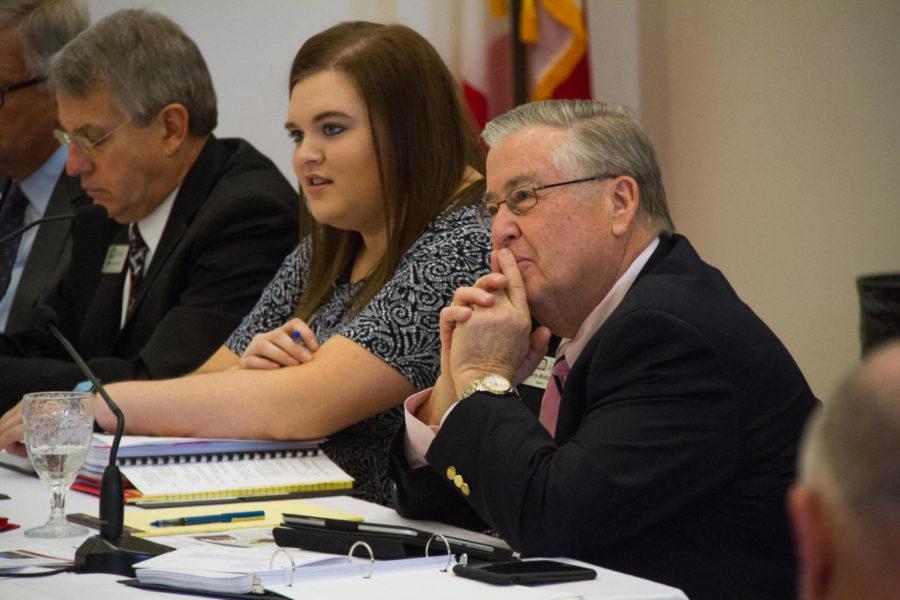Board of Regents discuss tuition increases at first day of November meeting
Regent Larry McKibben listens to Iowa School for the Deaf superintendent Steve Gettel speak during a Board of Regents meeting, Feb. 23 in the Alumni Center.
November 15, 2018
Thursday’s Board of Regents meeting featured a discussion around increasing tuition, alongside discussions about Iowa’s higher education.
Emphasizing the importance of stability in tuition fees, Board of Regents President Michael Richards discussed the board’s five-year plan to account for regent universities’ funding requirements. The plan set a baseline increase of 3 percent, although Richards said the actual increase could be higher if the Iowa Legislature does not provide additional funding.
“We believe this model provides tuition predictability for students and their families moving forward,” Richards said. “It is our intention to follow this approach for the next 5 years. Obviously, unforeseen circumstances could cause us to re-evaluate.”
He also said that tuition for the next school year would be determined later, after the board had received enough information about their funding from the state. The first reading of the tuition will occur in April before being finalized in June, as previous attempts to set tuition in the fall or winter forced the board to raise their stated tuition if the state did not meet their requests.
Richards said another focus of their tuition analysis was the cost of each school. Previously, Iowa State, the University of Iowa and the University of Northern Iowa all had equal undergraduate tuition rates, something he said the board planned to change.
“Clearly, one size does not fit all anymore,” Richards said. “When comparing resident undergraduate rates, the University of Iowa and Iowa State University are considerably lower than comparable universities. Conversely, we learned that the University of Northern Iowa needs to be more competitive in pricing than other Midwest comprehensive universities, which will help them attract students.”
As with the previous Board of Regents meeting, Thursday’s public comment section was dominated by citizens requesting further discussion about the University of Iowa’s Labor Center, which university officials had previously decided to shut down.
Some speakers highlighted the facility’s role in maintaining the history of Iowa’s labor, while others, such as union representative, Kelli Harrison, focused on the skills that the Labor Center imparts on Iowa workers.
“We won’t watch our state go backwards,” Harrison said. “Regardless of what you decide this week, the issue isn’t going away. My organization and tens of thousands of Iowans are committed to keeping the resources available for the next generation of Iowans.”
Enrollment numbers were another key presentation at the meeting, focusing on overall enrollment as well as a more granular analysis of various categories.
Enrollment at all three regent universities had dropped from the previous year, although Iowa State’s new freshman enrollment had actually increased since 2017.
All schools had a drop in their total undergraduate enrollment, and the University of Iowa was the only school to see a slight increase in its graduate student population — both Iowa State and the University of Northern Iowa’s numbers had dropped.
The number of international students attending Iowa’s regent universities also declined from 2017, from a total of 6,400 to 5,497, according to the presentation’s graphs. Although all groups dipped somewhat, the number of students coming from China dropped by the greatest margin, at 471 students — nearly 13 percent of the total number of Chinese international students.
A presentation on the University of Iowa’s Hospitals and Clinics came near the meeting’s conclusion, offering information on spending, facilities and technology. To cap off the meeting, University of Iowa researchers discussed the school’s medical research efforts including SPARK, a project attempting to research autism through genetic and medical data.
The Board of Regents will next meet on Friday, Nov. 16 to cover additional topics including campus safety, program changes and building requests. The first committee is scheduled to meet at 9 a.m., and, like Thursday’s session, the meeting will be live streamed online. For streaming and scheduling information, check the Board of Regents’ Twitter account, @IowaRegents.







